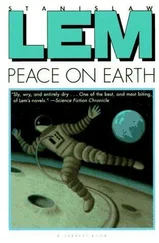Stanislaw Lem
His Master’s Voice
Translation of the Polish Glos pana done by Michael Kandel
a. b.e-book v3.0
The manuscript was found among the papers of the late Professor Peter E. Hogarth. That great mind, alas, was unable to put it into final form, though he had labored long over it. The illness that claimed him made the book’s completion impossible. Because the deceased was reluctant to speak of the work — a work unusual for him, and undertaken more out of a sense of duty than by choice — and reluctant, even, to speak of it to those near him, in whose number I am honored to have been included — certain obscurities and points of contention arose during the preliminary efforts to prepare the manuscript for publication. I must state, to be truthful, that in the circle of those who were made acquainted with the text there were voices raised in opposition to its publication: they claimed that such was not the intention of the deceased. There is to be found, however, no written testimony of his to this effect; one can only conclude that such opinions are without foundation. It was obvious, on the other hand, that the thing was unfinished, for it had no title, and one particular fragment existed only in a rough draft, which fragment was to have served — and here lies one of the principal doubts — as either a preface or an afterword to the book.
As friend and colleague of the deceased, and mentioned by him in his will, I have decided, finally, to make of this fragment, necessary for an understanding of the whole, the preface. The title, His Master’s Voice, was suggested to me by the publisher, John Keller, whom I wish to take this opportunity to thank for the great care he has given to the publication of this last work of Professor Hogarth. I should also like to express here my gratitude to Mrs. Rosamond Schelling, who so painstakingly assisted in the initial editing and in the final proofreading.
Professor Thomas V. Warren Mathematics Department Washington University, D.C. June 1966
Though I may shock many readers with the words that follow, it is my duty, I am convinced, to speak them. I never before wrote a book like this; and, since it is not the custom for mathematicians to introduce their works with statements of a personal nature, I could have spared myself the trouble.
It was as a result of circumstances beyond my control that I became involved in the events that I wish to relate here. The reasons I preface the account with a kind of confession should become evident later on. In speaking of myself, I must choose some frame of reference; let this be the recent biography of me penned by Professor Harold Yowitt. Yowitt calls me a mind of the highest caliber, in that the problems that I attacked were always, among those currently available, the most difficult. He shows that my name was to be found wherever the heritage of science was in the process of being torn down and the edifice of new concepts raised — for example, in the mathematical revolution, in the field of physico-ethics, or in the Master’s Voice Project.
When I came, in my reading, to the place where the subject was destruction, I expected, after the mention of my iconoclastic inclinations, further, bolder inferences, and thought that at last I had found a biographer — which did not overjoy me, because it is one thing to strip oneself, and another, entirely, to be stripped. But Yowitt, as if frightened by his own acumen, then returned — inconsequently — to the accepted version of me as the persistent, modest genius, and even trotted out a few of the old-standby anecdotes about me.
So I could set this book on the shelf with my other biographies, calmly, little dreaming, at the time, that I would soon be entering the lists with my flattering portraitist. I noted, also, that not much space remained on the shelf, and recalled what I had once said to Yvor Baloyne, that I would die when the shelf was filled. He took it as a joke, and I did not insist, though I had expressed a genuine conviction, no less genuine for being absurd. And therefore — to return to Yowitt — once again I had succeeded, or, if you like, failed, in that at the age of sixty-two I had twenty-eight volumes devoted to my person and yet remained completely unknown. But am I being fair?
Professor Yowitt wrote about me in accordance with rules not of his making. Not all public figures may be treated the same. Great artists, yes, may be drawn in their pettiness, and some biographers even seem to think that the soul of the artist is perforce a scurvy thing. For the great scientists, however, the old stereotype is still mandatory. Artists we view as spirits chained to the flesh; literary critics are free to discuss the homosexuality of an Oscar Wilde, but it is hard to imagine any historian of science dealing analogously with the creators of physics. We must have them incorruptible, ideal, and the events of history are no more than local changes in the circumstances of their lives. A politician may be a villain without ceasing to be a great politician, whereas a villainous genius — that is a contradiction in terms. Villainy cancels genius. So demand the rules of today.
True, a group of psychoanalysts from Michigan did attempt to challenge this state of affairs, but they fell into the sin of oversimplification. The physicist’s evident propensity to theorize, these scholars derived from sexual repression. Psychoanalytic doctrine reveals the pig in man, a pig saddled with a conscience; the disastrous result is that the pig is uncomfortable beneath that pious rider, and the rider fares no better in the situation, since his endeavor is not only to tame the pig but also to render it invisible. The notion that we have within us an ancient Beast that carries upon its back a modern Reason — is a pastiche of primitive mythologies.
Psychoanalysis provides truth in an infantile, that is, a schoolboy fashion: we learn from it, roughly and hurriedly, things that scandalize us and thereby command our attention. It sometimes happens, and such is the case here, that a simplification touching upon the truth, but cheaply, is of no more value than a lie. Once again we are shown the demon and the angel, the beast and the god locked in Manichean embrace, and once again man has been pronounced, by himself, not culpable, as he is but the field of combat for forces that have entered him, distended him, and hold sway inside his skin. Thus psychoanalysis is, primarily, sophomoric. Shockers are to explain man to us, and the whole drama of existence is played out between piggishness and the sublimation into which civilized effort can transform it.
So I really ought to be thankful to Professor Yowitt, for maintaining my likeness in the classical style and not borrowing the methods of the Michigan psychologists. Not that I intend to speak better of myself than they would speak; but there is, surely, a difference between a caricature and a portrait.
Which is not to say that I believe a man who is the subject of biographies possesses any greater knowledge of himself than his biographers do. Their position is more convenient, for uncertainties may be attributed to a lack of data, which allows the supposition that the one described, were he but alive and willing, could supply the needed information. The one described, however, possesses nothing more than hypotheses on the subject of himself, hypotheses that may be of interest as the products of his mind but that do not necessarily serve as those missing pieces.
With sufficient imagination a man could write a whole series of versions of his life; it would form a union of sets in which the facts would be the only elements in common. People, even intelligent people, who are young, and therefore inexperienced and naïve, see only cynicism in such a possibility. They are mistaken, because the problem is not moral but cognitive. The number of metaphysical beliefs is no greater or less than the number of different beliefs a man may entertain on the subject of himself — sequentially, at various periods of his life, and occasionally even at the same time.
Читать дальше












